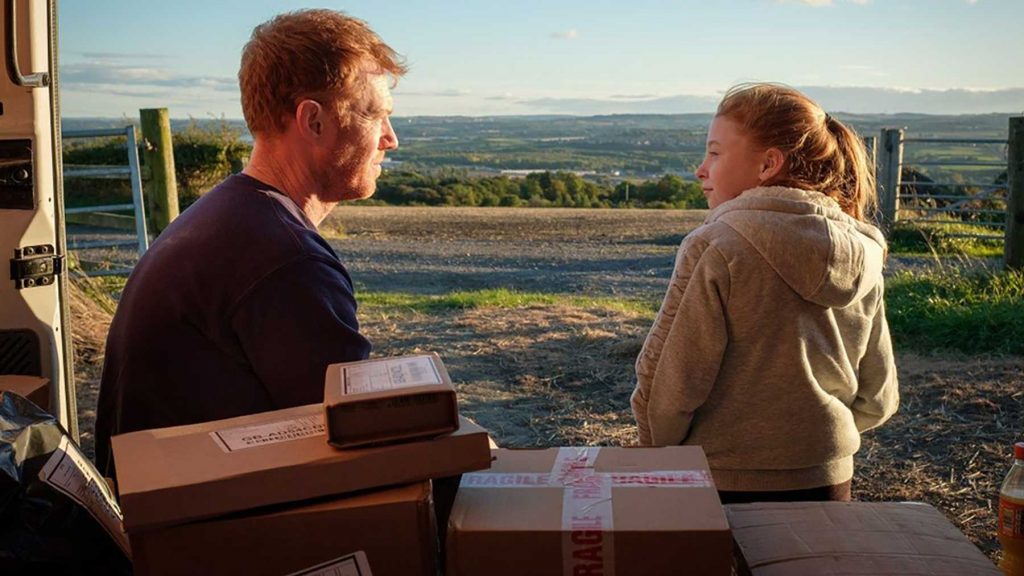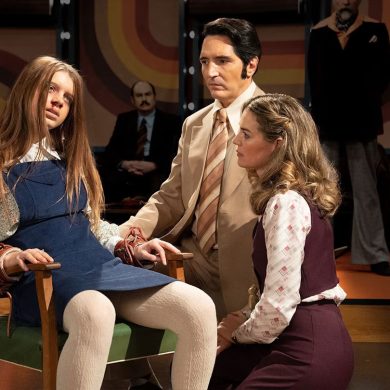Directed by Ken Loach, Sorry We Missed You stars Kris Hitchen, Debbie Honeywood, Rhys Stone, and Katie Proctor as a family fighting an uphill straggle against debt since the 2008 financial crisis. The dad Ricky has a new job as a delivery driver, mother Abby works an aged persons and disability carer, their son Seb is a wayward teen heading down a bad path, and their daughter Lisa Jane is caught in the midst of the heartache, stress, violence, and desperation of her family’s life.
Ken Loach is an angry filmmaker. From pretty much all his films, he is decrying an injustice against people, whether it’s the historical abuse of the Irish or generally the mistreatment of the British working class, and he shows no signs of stopping. What’s sad is that he should stop making movies, not because I don’t like them, but we shouldn’t have such grave injustices against the working class and those in poorer conditions in the first place. As long as the British government continues to commit harm and destruction of these people, Ken Loach will be there to criticise it endlessly in his well-made films.
Sorry We Missed You looks at a family just barely hanging on after losing everything a decade ago, and where they’re at now isn’t any better than not having anything. The film starts with Ricky’s boss Maloney explaining all the stipulations and new terms for simple job like a delivery driver. He’s not an employee, he’s a “self-employed franchisee”. What happens in his job isn’t covered by any insurance and its his responsibility to pay for a van, any broken equipment and sometimes he must work 14 hour days, 7 days a week. In the first 5 minutes, we instantly understand that this is our world, this is a job people are fighting for no matter what, and the higher-ups know it an exploit that desire. And then there’s Abby struggling to keep an honourable job caring for people with disabilities and aged persons. It’s a soul crushing trudge that she has no choice about and must deal with all the unfortunate things that come with such a job as well as trying to keep her family together even as they all eventually clash and drift.
Loach is going after a more broad theme of labour exploitation in the UK, showing the harsh realities that people face everyday in their working class jobs for which they receive no compensation, assistance, or workplace security, only more difficulties as things go on. He has some beautiful moments of humanity layered within Ricky and Abby’s daily working lives, like Ricky having Lisa Jane assist him in 1-hour deliveries or Abby having her hair brushed by an old woman while she sings a lullaby to her. It is in these touching and sweet moments, as well as the depressingly real ones that I found myself refusing to believe that these actors aren’t real people plucked from the shops. So much of this film feels like a documentary of real lives, and the performances reflect this incredibly reality and suck you in deeper into the sadness and truth of the situation.
Where Sorry We Missed You falters is not in its performances, story or themes but in some of Loach’s execution. Comparatively, I, Daniel Blake was just as angry at the British welfare system and the attempted destruction of the middle class, but had a beautiful undercurrent of the life of a man, mixed with tragedy and inspiration. Sorry We Missed You is darker and more downbeat, and can at times fall into blunt territories where Loach has previously been more subtle. This full-frontal and confronting approach works for the most part but can hold the movie back from fully engaging you in some important moments.
What sent me into a real philosophical and emotional spiral was the highly audacious ending. It’s not the content of the ending or anything, it’s just the ending itself, the fact that this movie ENDS in the way it does. Once you see it, you’ll understand what I mean, and the entire screening audience I was with was left stunned at its bleakness, pessimism but not feeling like it came out of nowhere. Loach and cinematographer Robbie Ryan shoot everything in this controlled, invisible point-of-view style like we are looking at things play out as observers, helpless to help these people. That is Loach’s direct intention, to make you feel sick as you watch people you feel like you know helpless to the system above them, its boot heel closing in on their necks, never understanding the beating pulse underneath. Sorry We Missed You is flawed and not of Loach’s best works, but it’s a vitally important story to be told right now and something which I implore you to see, as hard as it may be sometimes.
Director: Ken Loach
Cast: Simran Kaur, Debbie Honeywood, Kris Hitchen
Writer: Paul Laverty




